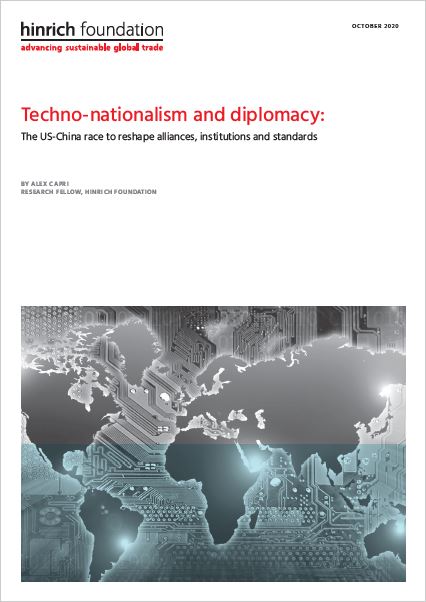Published 02 October 2020 | 5 minute read
The rise of techno-nationalist approaches has precipitated a US-China race to promote ideological values through the reshaping of institutions and standards. Governments are pursuing strategic alliances and partnerships to advance their strategic interests, values and politics. This will lead to the creation of new institutions and rule frameworks, or produce outcomes that will profoundly influence the institutions that govern global trade.
The US-China race to reshape alliances, institutions and standards
Techno-nationalism – mercantilist-like behaviour that links tech innovation and enterprise directly to the security, prosperity and stability of a nation – is forcing governments to pursue strategic alliances and partnerships that will profoundly reshape the international institutions and rule frameworks that govern global trade. This emerging “techno diplomacy” is designed to advance a nation’s techno-nationalist agenda through enticements and concessions, as well as through threat of negative outcomes.
The spread of hybrid warfare, which is designed to disrupt or disable an opponent short of military action, is a further driver as is the continuing challenge of updating existing rule frameworks, such as the WTO, and the emergence of alternative infrastructures through bilateral or multilateral free trade agreements.
This paper is the third in a series of Hinrich Foundation essays on US-China techno-nationalism, authored by Research Fellow, Alex Capri. You can read the first two essays by clicking on the links below:
This third essay offers a comprehensive survey of how techno-nationalism is reshaping diplomacy among states in today’s contested global economy.
Alex Capri and Andrew Staples of the Hinrich Foundation discussed the prospect of a bifurcation of standards and global tech trade, and the implications for state and non-state actors.
Capri investigates the current state of US-EU relations where both core differences (to taxation and governance of data, for example) and increasing convergence (on approaches to China) can be observed. The paper also documents the spread of China’s “techno-authoritarianism” around the world and notes its incompatibility with the liberal democratic model. Indeed, new partnerships, including the Global Partnership on AI (GPAI) and the G7 AI Initiative, that are designed to guide the liberal and transparent development of AI, stand in contrast to China’s export of techno-authoritarianism.
Further sections examine the impact of techno-diplomacy on how organizations such as NATO are grappling with hybrid warfare and cybersecurity, and on international rule frameworks. Capri notes that the WTO has failed to produce the necessary rules framework for digital trade and that countries are increasingly turning to bilateral digital carve-outs and free trade agreements to frame digital rules.
Techno-nationalism and diplomacy is an important new paper that will be of particular interest to policymakers, diplomats, academics, journalists and anyone interested in learning more about the ways in which techno-nationalism is reshaping our digital future and trading environment.
Listen to a summary of the report in this podcast, featuring Capri and Hinrich Foundation Director of Research and Outreach, Dr Andrew Staples.
© The Hinrich Foundation. See our website Terms and conditions for our copyright and reprint policy. All statements of fact and the views, conclusions and recommendations expressed in this publication are the sole responsibility of the author(s).












